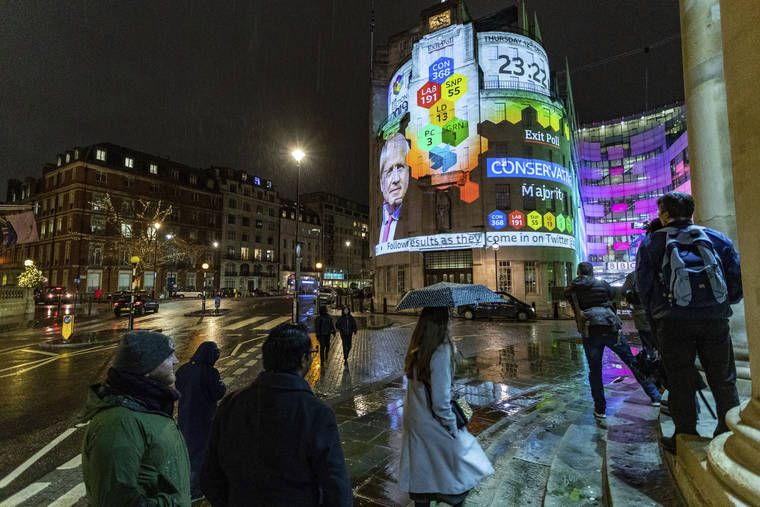LONDON — British businesses that have been hobbled for three years by fear and confusion over Brexit are getting a break.
The U.K. election result means Britain’s departure from the European Union will almost certainly happen – after multiple delays – on Jan. 31, as scheduled. It remains unclear how the Conservative Party of Prime Minister Boris Johnson will steer the economy beyond that, since so much of Britain’s future trade relations have yet to be negotiated once it has left the EU.
But for companies that have had to plan for all sorts of potentially chaotic outcomes to Brexit, even just a little clarity is a breath of fresh air.
“The idea that the situation with Brexit is going to be resolved is good for business,” said Andy Zneimer, who handles communications for a small soap business in east London called Clarity-The Soap Co.
The company had to prepare for the worst in recent months, when it looked almost likely that Britain would leave the EU without an exit agreement, which would have led to immediate and painful tariffs on trade, border checks and other red tape.
The company, which employs mostly visually impaired people in its workforce of 110, had built up its stocks of aluminum bottles and raw materials to make sure it was ready for any turn of events in Brexit. Now it’s looking to even add to its business.
“We are about to increase our capacity and making plans to develop eco-products,” said Zneimer.
The British pound and stock markets jumped higher on the outcome of the vote as investors welcomed the greater clarity on Brexit. The currency, which had risen in recent days on expectations of a Conservative win, is up another 2 cents against the dollar, at $1.330. London’s FTSE 100 blue-chip stock index rose 1.5%.
While Britain’s departure from the EU has long been considered damaging for businesses – particularly in Britain but also in neighboring EU countries like Ireland and the Netherlands – the delay in carrying out the exit itself has arguably proved as painful. Companies need clarity on the future rules of commerce to plan, invest and hire.
A sudden, non-negotiated break away from the EU would result in immediate tariffs on trade, checks on borders and limits on immigration. As part of the EU, goods, money and people have full freedom of movement.
A negotiated exit – which Johnson secured this year – would be less disruptive but how it affects the economy will depend on more detailed negotiations on future trade relations.
“This is the beginning of the reality of Brexit rather than the end,” said Ross Denton, a trade expert at law firm Baker McKenzie.
The prime minister has signaled that he wants looser economic ties with the EU, Britain’s biggest trading partner, to have the freedom to pursue deals with faster-growing economies further afield – from the United States to countries in Asia.
U.S. President Donald Trump was quick to congratulate Johnson on Twitter, exclaiming how the U.S. and Britain can strike a trade deal that is “far bigger and more lucrative than any deal that could be made with the E.U.”
As trade ties are stronger between Britain and the EU, that is unlikely. And Trump has a track record of taking a tough approach to trade, viewing it as a zero-sum battle to burnish nationalist pride rather than a way to build alliances.
Meanwhile, Britain would go into those talks as a weakened, more isolated nation on the world stage. The U.S. is Britain’s second-biggest export market. For the U.S., Britain is the fifth-largest.
Even after Brexit, Britain’s economic future will remain tied closely to that of the rest of Europe. British businesses depend on supply chains that snake across EU countries and on easily hiring EU workers.
And as with the U.S., Britain would be at a disadvantage in talks with the EU. The other 27 countries in the bloc are Britain’s largest trading partner, accounting for almost half its international trade. For the rest of the EU, Britain accounts for less than a fifth.
If Britain leaves on Jan. 31, it would have a transition period until the end of 2020, whereby it will remain in the EU’s tariff-free single market and customs union.
That means Johnson’s government needs to secure in just a few months a free trade deal that would typically take years to secure. He may look to extend that transition period for two years.
Zniemer, of the London soap company Clarity, believes there is no alternative to Britain seeking to keep close ties with its European neighbors.
“In an ideal world there would be a very healthy pact between the EU and Britain,” he said. “It is essential that any tariffs by both sides cancel out.”
Domestically in Britain, big companies seem relieved also at the decisive defeat for the opposition Labour Party, which wanted to nationalize some industries and raise business taxes.
Johnson will face pressure to deliver on his campaign promises to increase public spending on sectors like healthcare, after almost a decade of budget cuts that have eroded public services, heightened wealth inequality and stymied the economy. Together with an expected pick-up in private investment, that could help the economy next year.
“While the U.K. still faces serious risks and uncertainty from the upcoming U.K.-EU negotiations on the future relationship, the election result could be the first step towards a sustained economic and political recovery,” said Kallum Pickering, senior economist at Berenberg bank.
———
Geir Moulson in Berlin contributed to this report.


